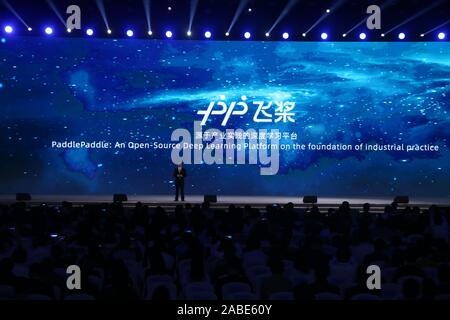Imagine a world where technology seamlessly understands and anticipates human needs—this is rapidly becoming a reality thanks to Baidu’s groundbreaking innovations in artificial intelligence. As a leader in the tech industry, Baidu has been at the forefront of AI advancements, developing cutting-edge solutions that are reshaping everything from language processing to autonomous driving. With a robust AI ecosystem, Baidu is not only enhancing its own capabilities but is also influencing the global tech landscape, driving forward applications that were once the stuff of science fiction.

Baidu’s AI Ecosystem
Baidu’s foray into artificial intelligence is nothing short of a remarkable journey. Known as the “Google of China,” Baidu has continuously pushed the boundaries of what’s possible with AI, investing heavily in research and development to create an ecosystem that is both innovative and influential.

Baidu’s AI Journey
Baidu’s AI journey began over a decade ago, when the company first recognized the transformative potential of artificial intelligence. With a vision to integrate AI into every facet of its operations, Baidu embarked on a path that would see it evolve into one of the leading AI powerhouses in the world. Early on, the company established dedicated research institutes and labs, such as Baidu Research and the Institute of Deep Learning, to foster innovation and explore new frontiers in AI.
Over the years, Baidu has made significant strides, unveiling a host of groundbreaking technologies and platforms. From natural language processing to computer vision and autonomous driving, Baidu’s AI journey is marked by a series of milestones that have propelled it to the forefront of the tech industry. The company’s commitment to AI is evident in its continuous investment in talent and resources, ensuring that it remains at the cutting edge of technological advancements.
Key AI Technologies from Baidu
Baidu’s AI ecosystem is built on a foundation of key technologies that drive its innovation engine. One of the most notable is ERNIE, a sophisticated language model that has evolved through multiple iterations to become a leader in natural language processing. ERNIE is designed to understand and generate human-like text, enabling applications that range from chatbots to content creation.
In addition to ERNIE, Baidu has developed pioneering technologies in computer vision, such as facial recognition and image processing. These technologies have found applications in various industries, from security and surveillance to retail and healthcare, demonstrating Baidu’s versatility and reach.
Autonomous driving is another area where Baidu has made significant contributions. Through its Apollo platform, Baidu has developed cutting-edge self-driving technology that is being tested and deployed in cities around the world. The platform integrates AI with real-time data processing to enable vehicles to navigate complex environments safely and efficiently.
Global Tech Industry Impact
Baidu’s innovations in AI have not only transformed the company itself but have also had a profound impact on the global tech industry. By pioneering new technologies and solutions, Baidu has set benchmarks for others in the industry, driving competition and spurring further innovation. The company’s open-source initiatives, such as PaddlePaddle, provide developers worldwide with tools to build and deploy AI applications, fostering collaboration and accelerating technological progress.
Furthermore, Baidu’s contributions to AI have had a ripple effect across various sectors, from healthcare to transportation, enhancing efficiencies and creating new opportunities. As Baidu continues to innovate and expand its AI ecosystem, the implications for the global tech landscape are immense, promising a future where AI plays an integral role in shaping our world.
ERNIE: Baidu’s Groundbreaking Language Model
Transitioning into the realm of language models, Baidu’s ERNIE represents a significant leap forward in artificial intelligence. As a cornerstone of Baidu’s AI strategy, ERNIE showcases the company’s prowess in developing advanced natural language processing technologies that rival some of the best in the world.

ERNIE Evolution: 1.0 to 3.5
The evolution of ERNIE from its initial version to the latest iteration, ERNIE 3.5, is a testament to Baidu’s commitment to innovation and excellence. ERNIE 1.0 laid the foundation with its ability to understand context and semantics in text, setting it apart from other models of its time. As the model progressed to ERNIE 2.0, it incorporated more sophisticated techniques, enabling it to better comprehend intricate language patterns and nuances.
ERNIE 3.0 marked a significant breakthrough, with enhanced capabilities in language understanding and generation. This version brought about improvements in handling complex queries and delivering more accurate responses. The journey reached new heights with ERNIE 3.5, which builds upon its predecessors with even greater efficiency and scalability, positioning it as one of the leading language models globally.
ERNIE’s Natural Language Processing Capabilities
ERNIE’s natural language processing capabilities are robust and versatile, making it a powerful tool for a wide range of applications. At its core, ERNIE is designed to understand and generate human-like text, a capability that is facilitated by its deep learning architecture and extensive training on vast datasets.
This language model excels in tasks such as sentiment analysis, text summarization, and machine translation, providing accurate and context-aware results. Its ability to process and understand intricate language structures allows ERNIE to perform complex tasks like question answering and text generation with remarkable precision. As a result, ERNIE is not only capable of enhancing user interactions but also of facilitating more efficient communication across different languages and cultures.
ERNIE in Real-world Applications
ERNIE’s versatility extends beyond theoretical applications, finding utility in a myriad of real-world scenarios. In the realm of virtual assistants and chatbots, ERNIE enhances user experiences by providing accurate, context-rich responses, making interactions more natural and engaging. Its capabilities are also leveraged in content creation, where ERNIE assists in generating high-quality, coherent text for various media and publishing platforms.
In the business sector, ERNIE aids in data analysis and customer service, allowing companies to derive insights from large volumes of text data and respond to customer inquiries with greater efficiency. Additionally, in sectors like healthcare and education, ERNIE’s language processing capabilities are utilized to improve information dissemination and personalized learning experiences.
By integrating ERNIE into these diverse applications, Baidu is not only demonstrating the model’s adaptability but also advancing the role of AI in enhancing everyday life. As ERNIE continues to evolve, its impact on both technology and society is set to grow, paving the way for more intelligent and intuitive AI systems in the future.
Baidu’s Computer Vision & Robotics Contributions
Moving into the exciting realm of computer vision and robotics, Baidu stands out as a pioneer, crafting technologies that redefine the boundaries of what machines can perceive and achieve. These innovations are not only enhancing the capabilities of AI but are also paving the way for a future where intelligent machines seamlessly integrate into our daily lives.

Facial Recognition & Image Processing Advancements
Baidu has made significant strides in the field of facial recognition and image processing, developing technologies that are both cutting-edge and highly effective. The company’s advancements in facial recognition are characterized by their accuracy and speed, allowing for real-time identification and verification in a variety of settings. These technologies are employed in sectors such as security, where they enhance surveillance systems, and in retail, where they enable personalized shopping experiences.
In addition to facial recognition, Baidu’s image processing capabilities are applied to tasks like object detection and image classification. These technologies are instrumental in automating processes that require visual input, such as quality control in manufacturing and inventory management in logistics. By pushing the boundaries of what is possible with image processing, Baidu is setting new standards for precision and efficiency in visual data analysis.
Autonomous Driving Technology
Autonomous driving technology is another area where Baidu is making remarkable contributions. Through its Apollo platform, Baidu has developed a comprehensive suite of technologies that enable vehicles to navigate safely and autonomously. Apollo integrates AI with advanced sensors and mapping systems to provide real-time data processing, allowing vehicles to make informed decisions in complex environments.
Baidu’s autonomous driving technology is being tested and deployed in cities around the world, with pilot programs and partnerships that aim to make self-driving cars a reality. The company’s commitment to safety and innovation has made Apollo one of the most advanced platforms in the field, offering solutions for ride-sharing, delivery, and public transportation. As the technology continues to mature, Baidu is poised to play a critical role in shaping the future of mobility.
Industrial & Commercial Robotics
Baidu’s contributions to industrial and commercial robotics are equally impressive, showcasing the company’s ability to integrate AI with mechanical systems to create intelligent machines. In the industrial sector, Baidu’s robotics solutions are used for tasks such as assembly, packaging, and inspection, automating processes that require precision and consistency. These robots are designed to work alongside humans, enhancing productivity and safety in manufacturing environments.
In the commercial realm, Baidu’s robotics innovations are applied to areas like logistics and customer service. Delivery robots leverage AI to navigate urban environments, ensuring timely and efficient deliveries. Meanwhile, service robots are deployed in settings like hotels and airports, providing assistance and information to visitors. By developing robots that can perform a wide range of tasks, Baidu is demonstrating the transformative potential of AI-powered robotics in both industry and daily life.
Through its advancements in computer vision and robotics, Baidu is not only enhancing its technology portfolio but is also driving forward innovations that have the potential to revolutionize the way we interact with machines. As these technologies continue to evolve, the impact of Baidu’s contributions will be felt across multiple sectors, heralding a new era of intelligent automation.
PaddlePaddle: Baidu’s Open-Source Deep Learning Platform
In the realm of deep learning frameworks, PaddlePaddle stands out as Baidu’s significant contribution to the open-source community. This platform is designed to empower developers and organizations to harness the power of AI with greater ease and flexibility, democratizing access to cutting-edge machine learning technologies.

PaddlePaddle Features & Capabilities
PaddlePaddle, short for Parallel Distributed Deep Learning, is distinguished by its robust set of features and capabilities that cater to both novice and experienced developers. One of its key strengths is its scalability, which allows it to handle a wide range of tasks from simple experiments to large-scale industrial applications. The platform supports diverse neural network architectures and offers extensive libraries and tools that streamline the development process.
Another notable feature is PaddlePaddle’s ease of use. Designed with user-friendliness in mind, it provides intuitive APIs and comprehensive documentation, making it accessible to developers with varying levels of expertise. The platform also supports seamless integration with other popular machine learning tools, enhancing its versatility and enabling developers to build complex AI models efficiently.
In terms of performance, PaddlePaddle is optimized for speed and efficiency, making it suitable for high-performance computing environments. Its capabilities extend to natural language processing, computer vision, and recommendation systems, showcasing its adaptability across different AI domains.
AI Development with PaddlePaddle
Developing AI applications with PaddlePaddle offers a multitude of benefits, thanks to its comprehensive ecosystem that supports the entire machine learning workflow. From data preprocessing and model training to deployment and monitoring, PaddlePaddle provides the resources needed to develop AI solutions from start to finish.
One of the key advantages of using PaddlePaddle is its support for distributed computing, which allows developers to train models on multiple devices simultaneously, significantly reducing training time. This capability is particularly beneficial for organizations looking to scale their AI operations and deploy models in production environments quickly.
Furthermore, PaddlePaddle’s open-source nature encourages collaboration and innovation, as developers can contribute to its ongoing development and share their solutions with the community. This collaborative approach fosters a vibrant ecosystem where best practices and new ideas are continuously exchanged, accelerating the pace of AI innovation.
PaddlePaddle Success Stories & Use Cases
PaddlePaddle has been at the heart of numerous success stories, demonstrating its effectiveness across a variety of use cases. In the healthcare industry, PaddlePaddle has been used to develop AI models that assist in diagnosing diseases and analyzing medical images, improving accuracy and efficiency in clinical settings.
In the field of natural language processing, PaddlePaddle powers applications such as chatbots and language translation services, enhancing communication and accessibility. Its capabilities are also leveraged in the finance sector, where AI models built on PaddlePaddle are used for risk assessment and fraud detection, helping financial institutions make informed decisions.
Beyond individual applications, PaddlePaddle has played a pivotal role in advancing research and development in AI. By providing a flexible and powerful platform, it enables researchers to experiment with new algorithms and explore innovative solutions to complex problems.
As PaddlePaddle continues to evolve, its impact on AI development is set to grow, offering developers and organizations the tools they need to create intelligent applications that drive progress and transformation across industries. Through its open-source approach, PaddlePaddle embodies Baidu’s commitment to fostering collaboration and innovation in the global AI community.
Future Directions: Baidu’s AI Vision
Looking ahead, Baidu’s vision for the future of AI is both ambitious and forward-thinking. As the company continues to innovate, it is laying the groundwork for advancements that promise to redefine the boundaries of technology and its applications. Baidu’s future directions are centered around three key pillars: quantum computing, ethical AI development, and collaborative research and open innovation.

Quantum Computing Initiatives
Quantum computing represents the next frontier in computing technology, and Baidu is actively exploring its potential through various initiatives. Recognizing the transformative power of quantum computing, Baidu aims to leverage its capabilities to solve complex problems that are beyond the reach of classical computers. The company’s efforts include the development of quantum algorithms and the establishment of a robust quantum computing infrastructure.
Baidu’s investments in quantum computing are geared towards creating a platform that can accelerate AI research and enhance computational efficiency. By integrating quantum computing with AI, Baidu envisions a future where complex simulations, cryptographic solutions, and optimization problems can be addressed with unprecedented speed and accuracy. As these initiatives progress, Baidu is poised to play a significant role in shaping the future landscape of quantum technology.
Ethical AI Development
As AI technologies continue to evolve, Baidu is committed to developing solutions that are not only innovative but also ethically sound. The company recognizes the importance of addressing ethical considerations in AI, such as privacy, bias, and accountability. To this end, Baidu is implementing guidelines and frameworks to ensure that its AI systems are developed and deployed responsibly.
Baidu’s approach to ethical AI development involves transparency and inclusivity, fostering an environment where ethical considerations are integral to the AI development process. This includes engaging with stakeholders across society to understand diverse perspectives and incorporate them into AI design and implementation. By prioritizing ethical considerations, Baidu aims to build trust and ensure that its AI technologies benefit society as a whole.
Collaborative Research & Open Innovation
Collaboration and open innovation are central to Baidu’s strategy for driving AI advancements. By partnering with academic institutions, research organizations, and industry leaders, Baidu seeks to create a collaborative ecosystem that accelerates progress and fosters innovation. These partnerships facilitate the exchange of ideas and resources, enabling Baidu to tackle complex challenges and explore new avenues of research.
Baidu’s commitment to open innovation is further exemplified by its support for open-source projects, such as PaddlePaddle. By sharing its technologies and insights with the global community, Baidu is encouraging collaboration and empowering developers worldwide to contribute to AI advancements. This approach not only accelerates technological progress but also ensures that the benefits of AI are accessible to a broader audience.
In summary, Baidu’s vision for the future of AI is driven by a commitment to innovation, ethical development, and collaboration. By investing in quantum computing, prioritizing ethical considerations, and fostering a culture of open innovation, Baidu is paving the way for a future where AI plays a transformative role in society. As these initiatives unfold, Baidu’s impact on the global tech landscape is set to grow, heralding a new era of intelligent and responsible technology.